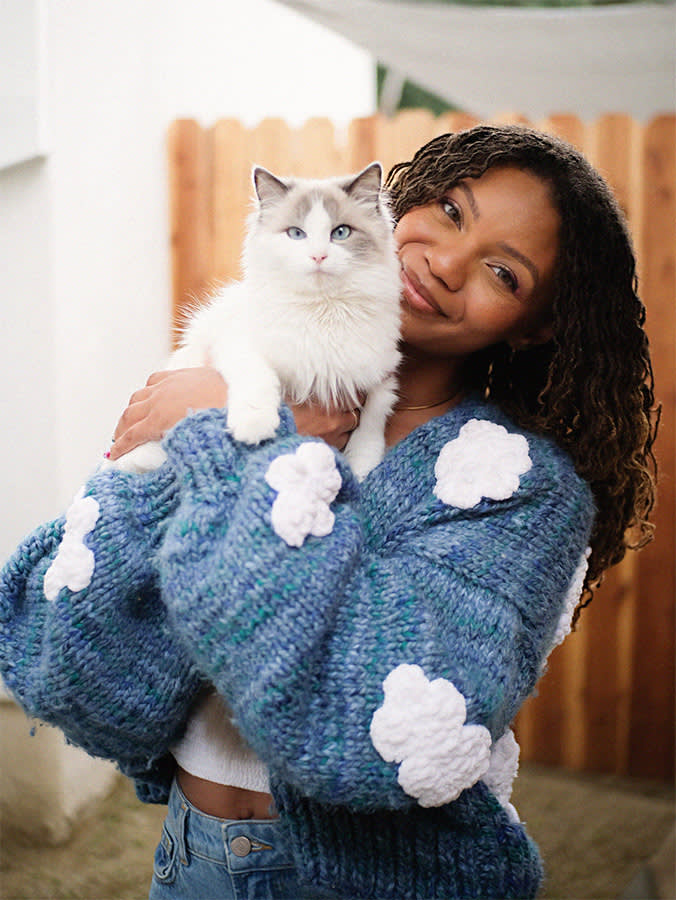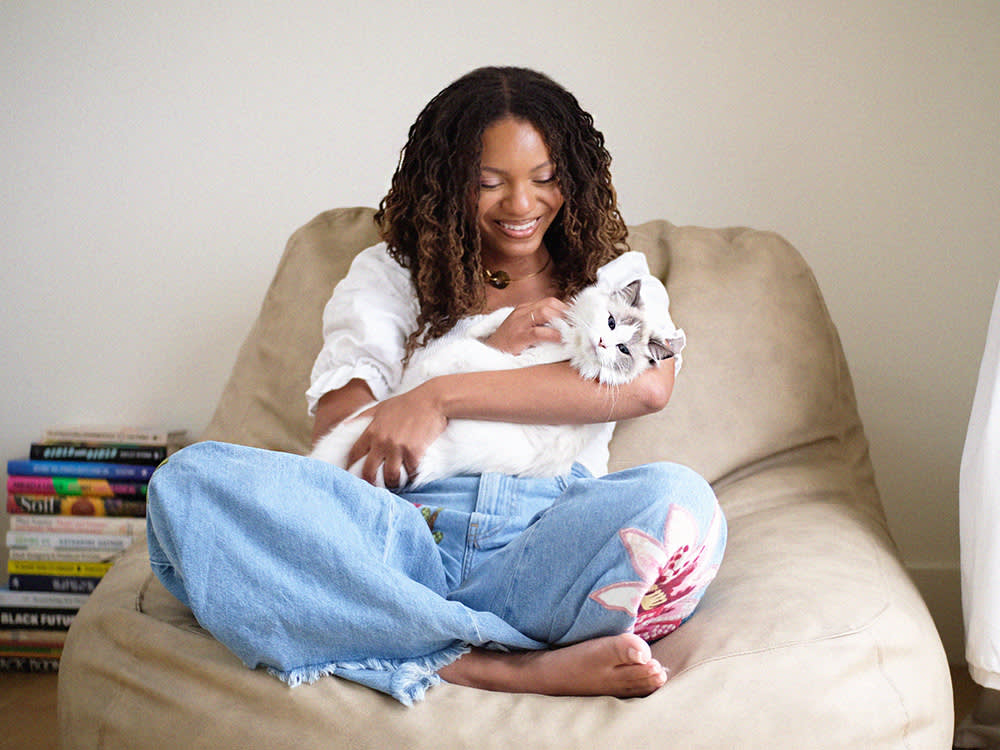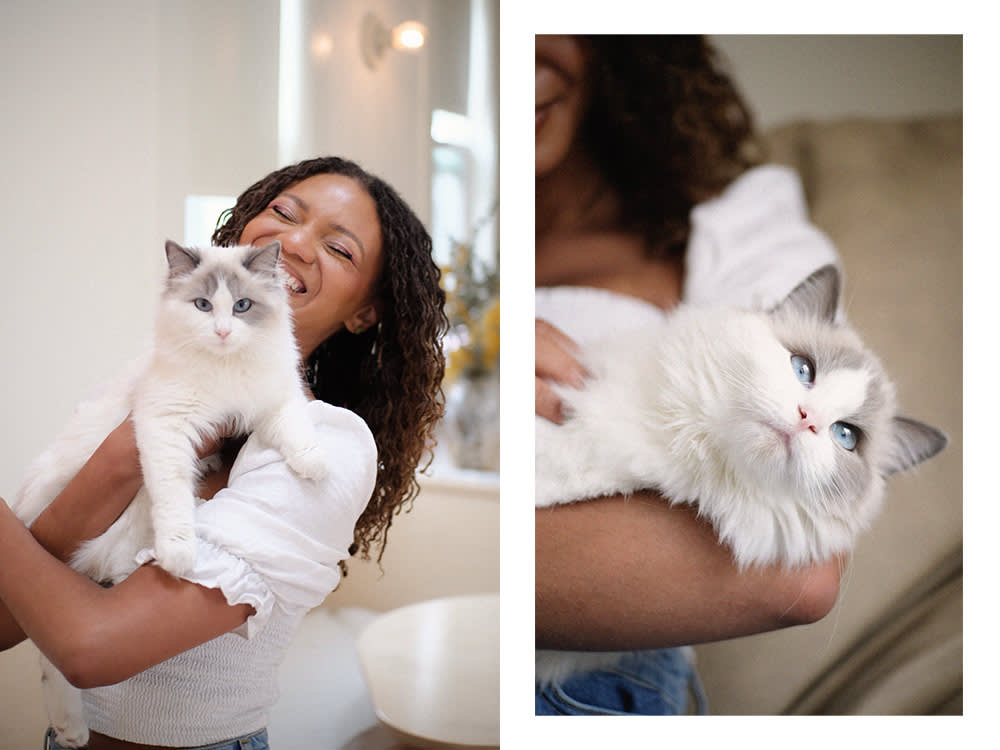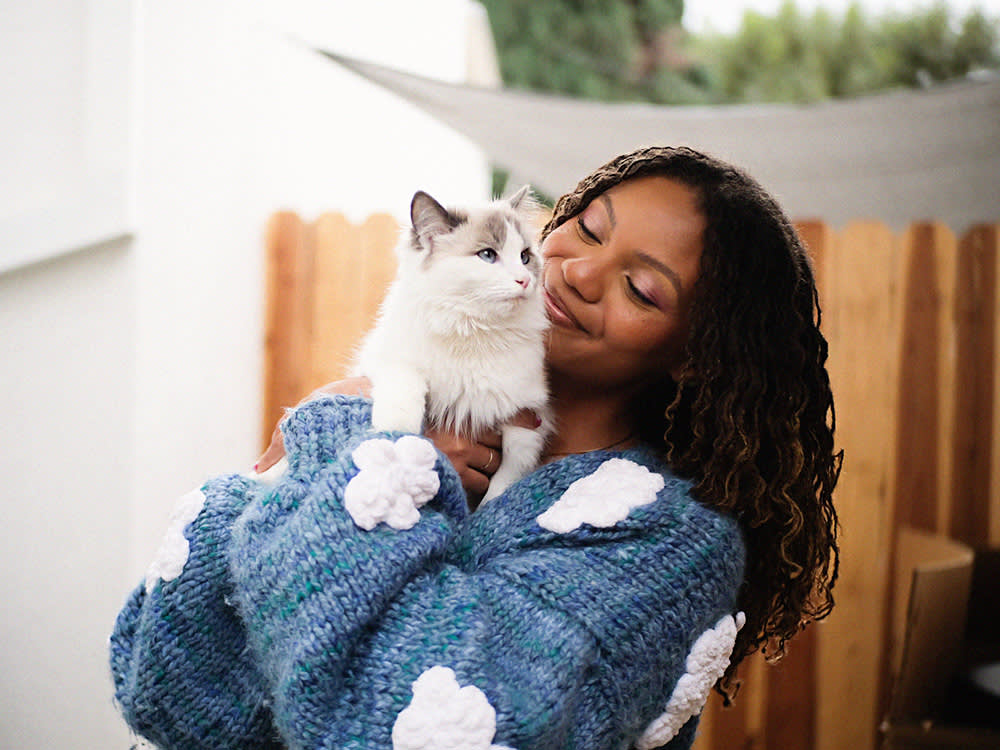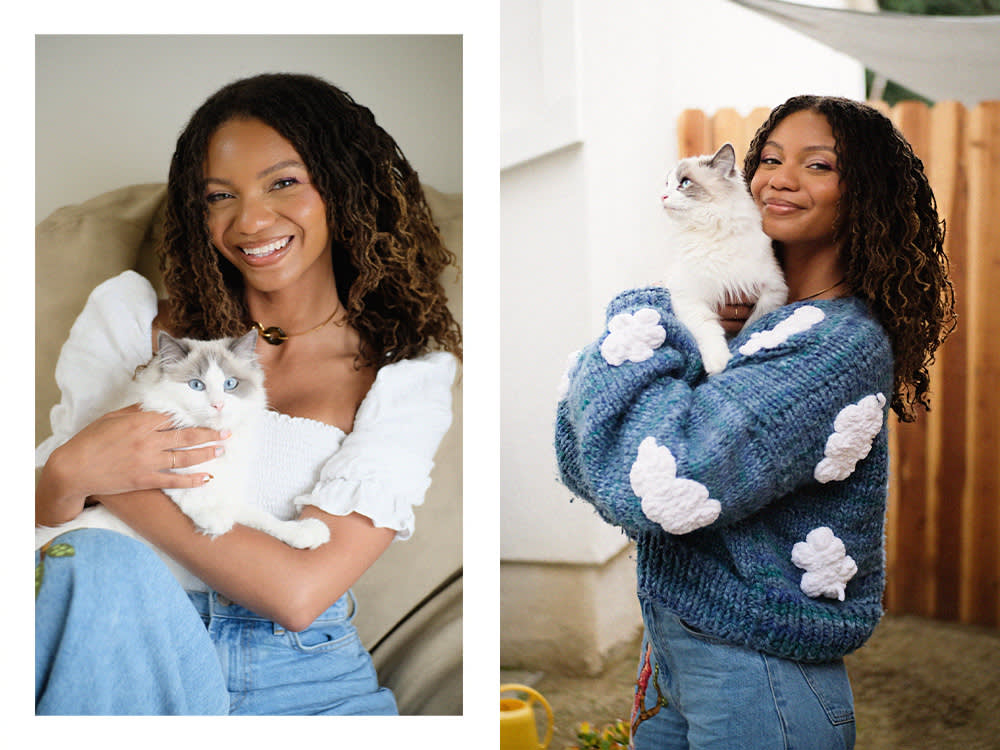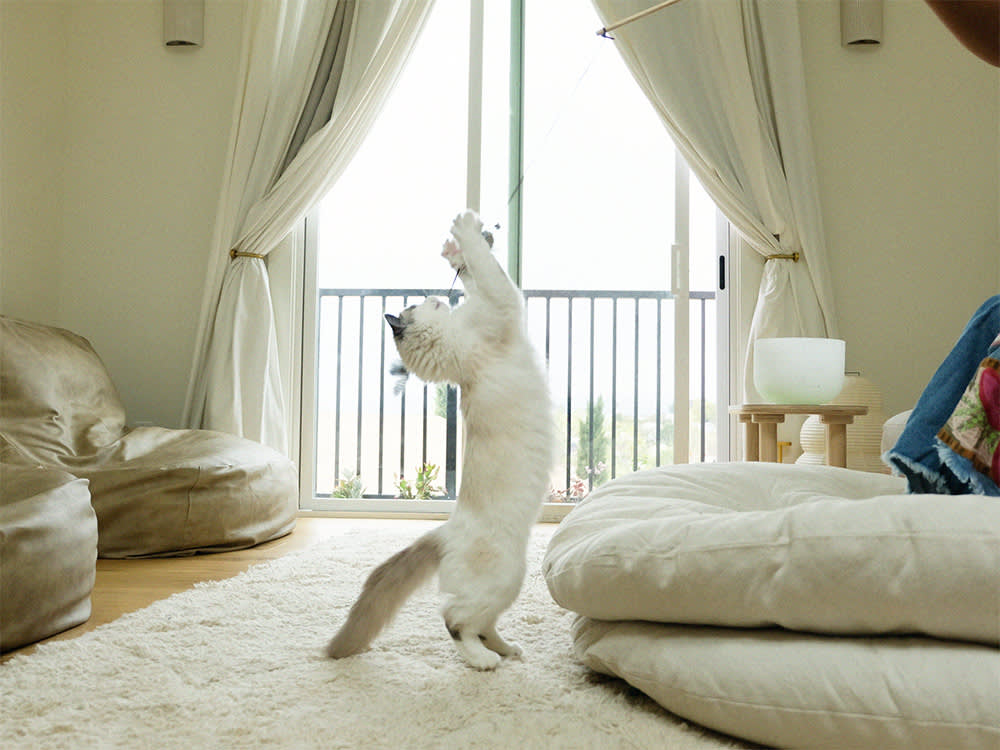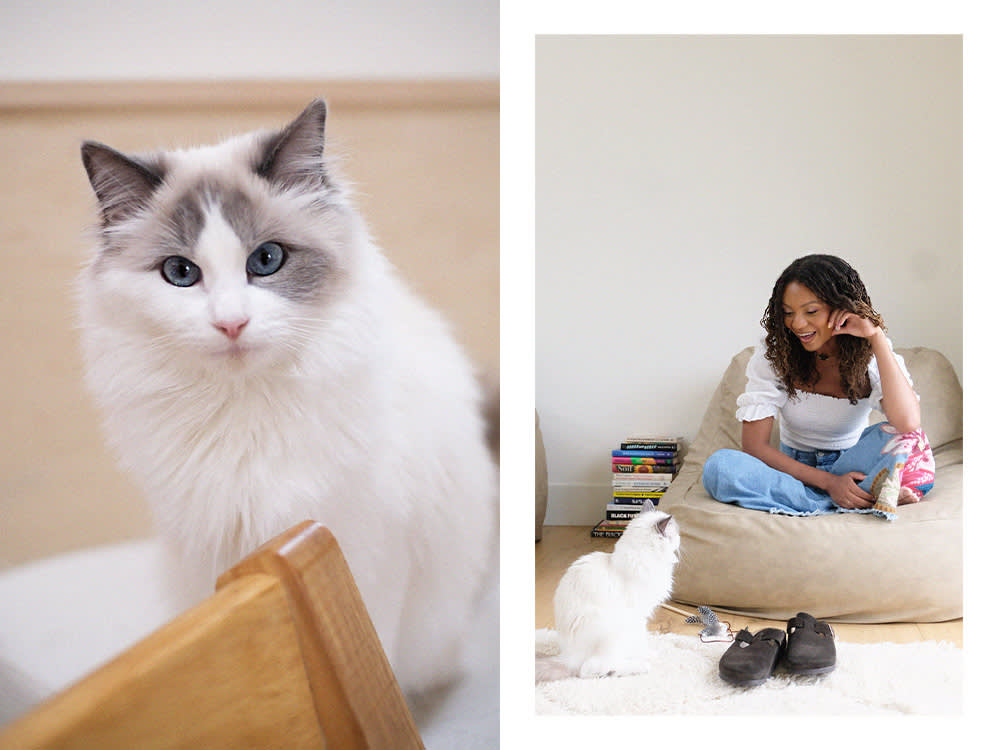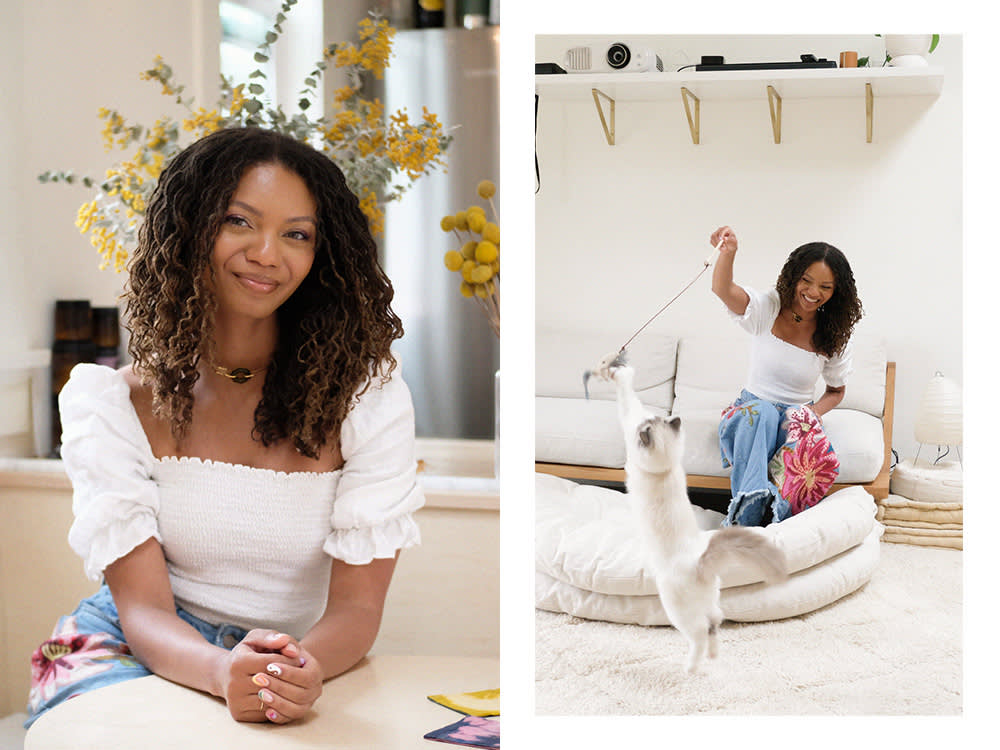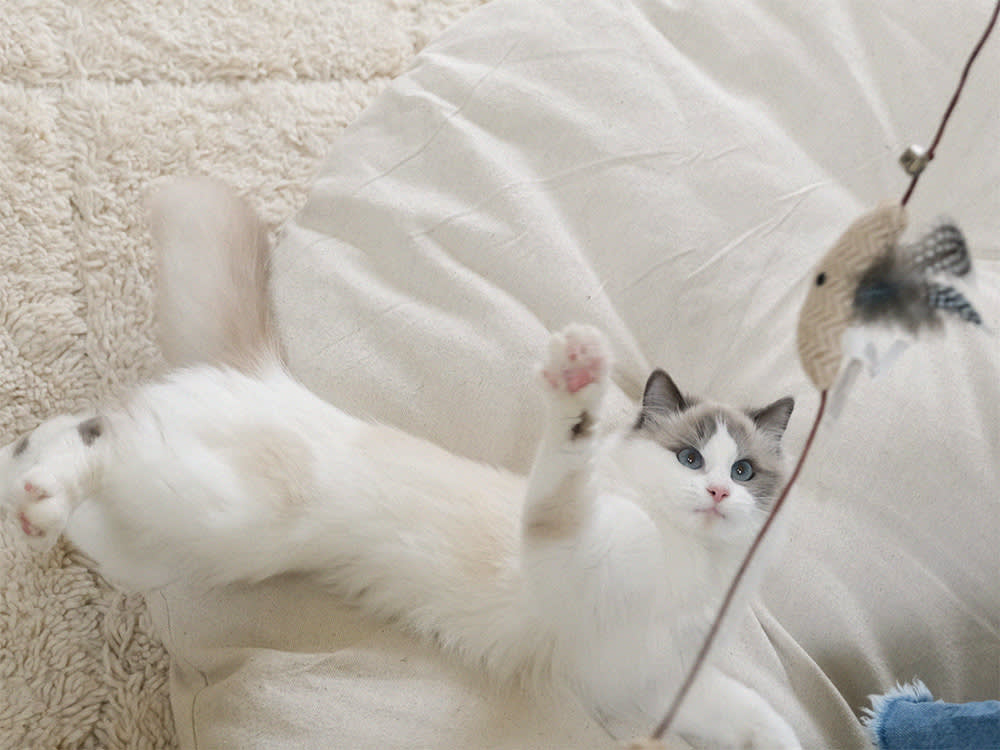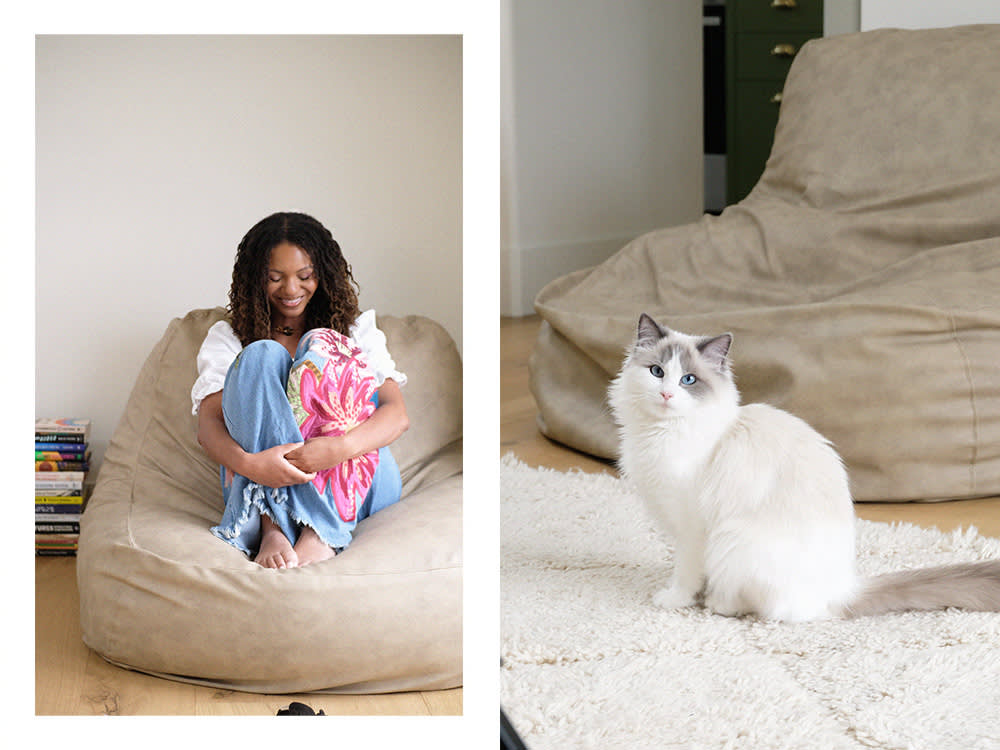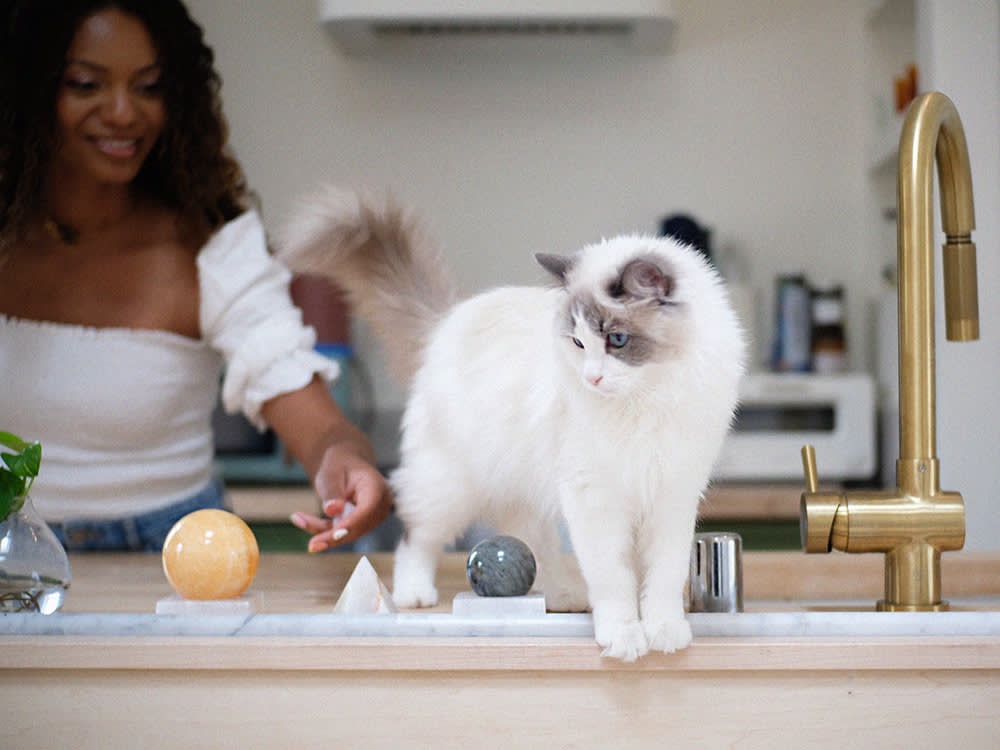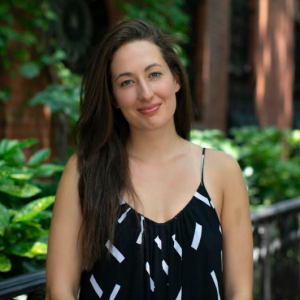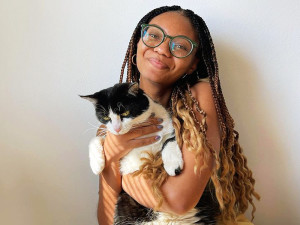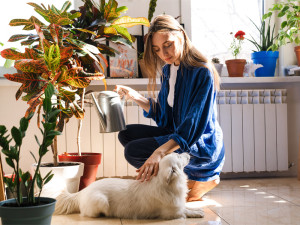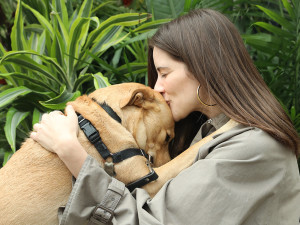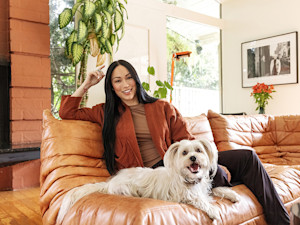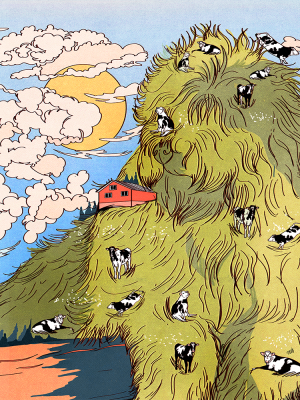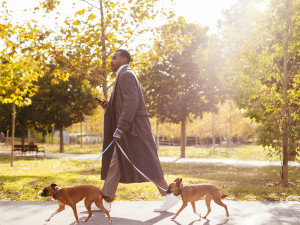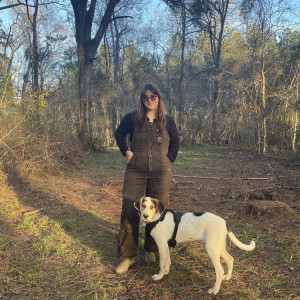Leah Thomas’s Cat Is a Specially Trained Climate Justice Warrior
The Intersectional Environmentalist founder finds big joy in the tiny lap cat who enjoys staring blankly at the Zoom screen.
They say life can change in a day, but Leah Thomasopens in new tab’s transformed in a single Instagram post. It was May 28, 2020, and Thomas, reeling from the recent murder of George Floyd, was frustrated by the lack of response from the environmental spaces she’d been working in for years.
“I’m calling on the environmentalist community to stand in solidarity with the Black Lives Matter movement and with Black, Indigenous + POC communities impacted daily by both social and environmental injustice,” Thomas, who was working in sustainable fashion at Patagonia at the time, wrote in her caption. She paired it with an “Environmentalists For Black Lives Matteropens in new tab” graphic, posted it to her grid, and walked away. Soon, in a turn even Thomas couldn’t have predicted, the post went viral, amassing nearly 50,000 likes and propelling her down a new personal and professional path.
Thomas’s post struck a chord with everyone who saw it. Suddenly, people across the country and the world were hungry for more information on the parallels between social justice, racial justice, and the environment.
In response, Thomas and a few like-minded friends launched Intersectional Environmentalistopens in new tab (IE), a non-profit that advocates for a more diverse and equitable environmental movement through educational materials, social media campaigns, and community programming. One of the organization’s main objectives is to bring visibility to the stories of environmentalists across genders, racial experiences, and socioeconomic backgrounds. “If you look at environmental films, nature storytelling, or the books that we highlight about the exploration of the West, it’s usually pretty white and male,” Thomas, who studied environmental science at a predominantly white college, tells Kinship. “I think this falsely leads people to believe that even outdoor exploration or camping are only reserved for a specific demographic.”
How much do you spend on your pet per year?
Thomas wants more people to know names beyond John Muir, like Hazel M. Johnsonopens in new tab, the mother of environmental justice from the South Side of Chicago, and Betty Reid Soskinopens in new tab, a 101-year-old Black recently retired opens in new tab National Park Service ranger Thomas affectionately calls “the coolest environmentalist I know.”
Over the past three years, Thomas has graced the pages of Vogueopens in new tab, been named a rising star by TIMEopens in new tab, written a book called The Intersectional Environmentalistopens in new tab, become a well-respected public speaker, and shared conversations with Malalaopens in new tab and Al Goreopens in new tab. Although her message can be heavy and her work taxing, the St. Louis-born activist, author, and host of the climate-change podcast As She Risesopens in new tab has a breezy, warm, and joyful presence. She’s buoyed by family, friends, and one very cuddly cat named Sunny.
Sitting small at about 10 months old, the Ragdoll kitten is never far from Thomas’s side (or more specifically, her lap). “She’s just the perfect princess cat,” Thomas says, as she chats with us from her home in Los Angeles.
How did you and Sunny find each other?
I was looking for an emotional-support cat because I have a busy work life, and I work from home. So, I started researching different cats that are extremely cuddly, and I stumbled across Ragdoll cats. Really randomly, there was someone on Craigslist of all places (which I don’t recommend) who said that they had to get rid of this beautiful Ragdoll kitten because their son was allergic. We started talking about rehomingopens in new tab her, and that’s how she came into my life.
Is she as cuddly as you were hoping?
Yeah, excessively so. She’s present in all the things I do, but it’s really cute. She likes to be picked up like a baby, and she follows me around at my feet as I’m walking from room to room. And when I’m working, she definitely joins my video calls. She’s been doing this thing where she’ll perch up right next to me and stare at the frame. It’ll be me in serious video calls, like, explaining climate justice, with Sunny just staring at the screen.
You’ve spoken out about the need for more joy in the climate space. Why do you think this is important, and how has adopting Sunny brought more joy into your life?
I like to infuse joy and humor into my work to show people that you can be passionate about serious issues, like social and climate justice, but that doesn’t have to be your entire identity.
I know a lot of younger climate activists in the Fridays For Futureopens in new tab wave of activism who feel like they have to be so serious all the time and can’t experience joy. So, I just try to maybe overdo it sometimes to show them that they can have other elements of their lives. And I think sharing my love for my cat is a way for people to see that. It’s nice, because my following now understands that I’m a whole person.
For those who are new to intersectional environmentalism, how do you define it?
Intersectional environmentalism is a lens that you can apply to environmentalism to make sure that equity is at its center. It’s an inclusive approach to environmentalism that advocates for the folks most impacted by the climate crisis, like lower-income and BIPOC communities. Not only does it make sure that their stories are told, but it also ensures they have positions in leadership, etc.
It’s not forcing anything that’s not true. It’s just including different interpretations of what environmentalism can look like to show everyone that we all have a connection to the earth because this is our home planet.
Another thing that I really respect about you is that you don’t claim to be a “perfect” environmentalist or live a completely zero-waste, zero-emissions life. How do you let go of the need to be perfect as a pet parent?
I think people are really treating their pets as human children right now — which I’m all for; I do it, too. But I think maybe we’re projecting a little bit onto our pets. Sometimes, I’ll have these questions like, “Is [Sunny] fulfilled? Is she happy?” If I’m asking if my cat is fulfilled, I think I’m really asking myself if I’m feeling fulfilled.
I know some folks who want their pets to be vegan. For me, that’s not something that’s really crossed my mind. I’m like, “You know, it’s OK if she has canned food,” and I’m not cooking her beef brisket every day, even though I’m seeing people do that online. I’m doing the best that I can for my current situation.
I think we just have to remind ourselves that our pets are all right. If they’re getting lots of love, eating good food, and having us as companions, they’re going to be OK.
How do you think the pet industry is doing in terms of sustainability?
I live in Silver Lake in Los Angeles, which is so gentrified, I’m afraid to admit, and there are all of these niche healthy pet stores. But when I go there, it’s like, “Oh, my God, this is so expensive and inaccessible.”
I wish everyone had access to things like organic pet food. It would be great if there was an industry standard so no matter what price point, there would be regulations about what you can put in pet food to make sure that every pet has access to yummy, healthy food. That would be something that I would be down to get behind.
Speaking of treating your pet, does Sunny have any favorite toys? What does she like to play with?
Yeah, she’s strange. She likes to play with shadows on the wall, and she’ll chase a ball. Her favorite toy is probably this little feather holder — she just likes to run around and exhaust herself. And then she likes to sit and look out the window and do that weird cat call if she sees a bird.
I feel like cats are kind of the environmentalists of the pet world — they can play with used boxes and don’t need lots of new stuff.
They really do. It’s really cute.
We’re coming off of April, which is Earth Month, a time when many companies make new sustainability pledges. What advice do you have for people who are trying to find companies that are actually doing the most good?
It can be really difficult. I would recommend people look at labels: Things like B Corp, Fair Trade Certified, organic, etc. And also try your hardest to support local, which is often one of the most sustainable options. So, if there’s a local pet store down the street, support them.
What other eco-actions would you encourage people to take?
Research the climate-justice organizations in your community and see if you can volunteer there. You don’t have to reinvent the wheel; there are so many really amazing organizations that need a lot of help. It can be really fulfilling, and once local communities are strong, that spreads to states, and that spreads to federal action. So, that’d be my little tip.
I read the 2022 IE Impact Report, and you and your team have gotten so much done. What accomplishment are you most proud of?
One thing I’m really proud of is our new free-book programopens in new tab, which is something that I always wanted to do to help increase accessibility to diverse environmental stories. We purchase books from local independent bookstores and then give them to folks for free. It supports local bookstores and gives people some pretty cool books.
In February, for Black History Month, we had a collection of books by Black authors talking about environmentalism. And through our virtual program, people could go to our website and check them out for free. The only thing we asked is that they read the book and then passed it on to someone else. The books always sell out in a couple of minutes. Everybody’s like, “We want books! We want books now!” It’s always so fun.
Your book — an introduction to intersectional environmentalism — came out last year. What’s been the reaction?
It’s been really fun. I’m still just so stoked that I have a book out in the world. For the book tour, I had a form that students around the country could fill in to ask me to talk about the book, virtually or in person. And for a month, I met with students at colleges around the country. And they would say, “We need a book like this. We want to feel these topics reflected in our textbooks.”
In moments like that, I just get so excited. I’m glad that people can enjoy it as an introductory text. I think what excites me the most is seeing all the books that will come out after mine. Now, I have all these other activist friends who are writing books and expanding on some of the themes in my book, so I’m really excited for all the new literature that’s going to come out in the next five years or so that really explores what intersectional environmentalism means.
How can people support the work you’re doing at IE?
You can support IE by just sharing our stuff on social mediaopens in new tab and then also donating to our collectiveopens in new tab. And by coming to our eventsopens in new tab and telling your friends about them!
What’s next for you and IE — and Sunny?
Sunny is just going to be chilling. She’s living life. I do have a cat backpack, and I’m going to try to take her to the park in the coming weeks.
I’m really excited to be planning “Earth Sessionsopens in new tab,” our climate justice concert series. We’re hoping to do two really big shows kicking off during Climate Week this year — so stay tuned. I’ve also been dabbling in the world of documentary filmmaking, and I’m excited to see where that goes.
At IE, we’re bringing on a board and getting organized. We’re seeing how we can take this organization that started out super grassroots and put some legs to it so it can last for years and years to come.
